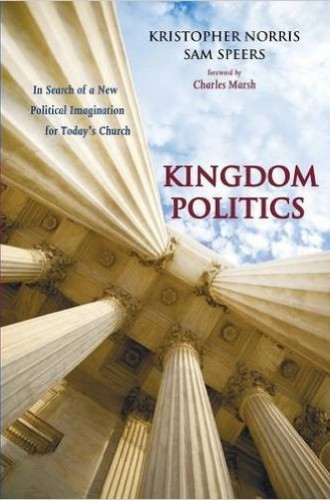Politics beyond party
Back around 2003, our church youth group placed a yard sign out near the road that said, “War Is Not the Answer.” The responses were interesting: the church received lots of phone calls, mostly outraged, demanding that the sign come down, as well as occasional calls of support and gratitude. About two weeks later we showed up on a Sunday morning to see that the church’s next-door neighbor had lined his property with 50 large American flags.
What surprised me the most, and disappointed me the most, was that the predominant response to the church’s yard sign was a dismissive, “Oh, they’re just Democrats.” The fact that Democrats in Congress, just like Republicans, had voted for the recent resolution to invade Iraq did not matter. The possibility that the sign might have been a witness to the way of Jesus was incomprehensible in our politicized culture, in which Democratic and Republican are the only options for understanding politics. Thirty years ago an antiwar church sign might have been labeled liberal, 50 years ago it might have been called communist, and now it’s simply Democrat. It’s never about Jesus.
Read our latest issue or browse back issues.
Kristopher Norris and Sam Speers seek to expand this narrow understanding of politics. Graduate students, writing under a grant from the University of Virginia’s Project on Lived Theology, Norris and Speers visited five congregations around the country, attending, participating, interviewing, and watching how these congregations practiced politics.
Norris and Speers began their research with the assumption that politics is part of the problem with the contemporary American church, whether congregations fly the flag or post antiwar signs—or avoid politics in every possible way. By the time they had finished writing, the authors had changed their minds. They had come to realize that creating a politics that is wider and deeper than the two-party divide and is rooted “in the king and kingdom” may be an answer to the American church’s woes.
For Norris and Speers, “kingdom politics” are seen in the church practices that form a congregation’s loves and desires—how a congregation greets one another on a Sunday morning, what a church meeting looks like and how it’s conducted, how communion is celebrated, and what mission endeavors the church is involved in. These ordinary practices shape the congregation’s understanding of what and whom they are to love—and how. They demonstrate the church’s “ultimate allegiance.” These practices are a witness to the wider world, pointing to the congregation’s ultimate love, Jesus Christ the King, and to his kingdom.
On their two-year, five-church tour, Norris and Speers focused on leadership structure, missions, and practices of worship so they could provide readers with snapshots of each congregation’s politics as known through its practices. Each chapter, organized around one of the congregations studied, begins with some background on the congregation’s history and context, and the expectations of the authors.
Norris and Speers include themselves in the narrative, and this is part of what makes the book engaging. Lived theology is participatory theology; there is no single objective, abstracted perspective from which these congregations can be studied. The authors came to each congregation with certain presumptions, and they were affected and changed by their new experiences.
They visited the 20,000-member “purpose-driven” Saddleback Church in Southern California, which is committed to the “missionhood of believers” and to the idea that the local church can change the world. At Saddleback, everyone participates: people are introduced to the faith in worship, then funneled into small groups and trained for mission. Next they visited the old mainline First and Franklin Presbyterian Church in downtown Baltimore, which has long been involved in progressive and social justice causes—including, since 1980, LGBT issues. Very different from those congregations was their next stop, Solomon’s Porch in Minneapolis, a congregation founded early in the emergent church movement, which identifies itself as a postmodern “band of misfits.”
The authors’ next site was Prairie Street Mennonite Church in Elkhart, Indiana, a small, well-educated congregation situated near a Mennonite seminary and just down the highway from Goshen College. Involved in local missions efforts that sometimes lead to advocacy in local politics, Prairie Street often partners with various other groups involved in the community. Finally the authors visited Ebenezer Baptist Church in Atlanta, “America’s Freedom Church” and the home congregation of Martin Luther King Jr.
Will Campbell once began a book review by saying that he was mostly nit-picking a fine book, and that’s what I’m going to do. I wish the authors had talked more about the context of each congregation and how that context could reinforce a church’s politics or engender a kind of perpetual over-againstness. I wondered why they chose these five congregations and not others (they did not visit a Roman Catholic church, for example). I did appreciate their openness to each church they visited, and their openness helped me to be open too.
Like the authors, I found myself critiquing the congregations, but I also discovered ways in which I identified with each of them. Having grown up Southern Baptist, I could even identify with Saddleback and its audacious vision of changing the world. I connected with elements of First and Franklin and its long advocacy for the left-out and the beaten-down, as well as to some of the “We’re not like other churches” attitude of Solomon’s Porch. I most identified with Prairie Street—small, educated, with partnerships and grassroots missions leading to grassroots politics. Ebenezer also was very familiar to me and resonated with my own sympathies with the civil rights movement.
Norris and Speers are clear that the church needs to be aware of how political it already is and how politically formative are practices of worship, decision-making, missions, and ministry. Only as we are deeply rooted devotionally and politically in the “king and kingdom” are we able to venture into the politics of the state. Even then we are at high risk of being co-opted by the right or the left, Republicans or Democrats, and of losing our identity as the church of Jesus Christ.
In several places the authors ask how much we bring our preformed politics into church and how much the church transforms us into disciples of Jesus with a Jesus kind of politics. Norris and Speers say that the key question is “Where does your allegiance lie?” Is your allegiance to a particular cause, party, or nation, or is it to God and God’s kingdom? They conclude: “If a church practice is motivated by allegiance to Christ and aligned with the objectives of the kingdom, the question of whether the church is using partisan political channels becomes secondary.”
I agree, but I’m also aware of how difficult this stance is in the local contexts and congregations where theology is lived. For example, I had a spirited conversation with a couple of fellow ministers who are flag-waving members of the religious right and expend a lot of air and heat in their pulpits on “taking America back,” quoting generously from Leviticus and Deuteronomy. I countered that our calling was to begin with and to preach Jesus Christ, especially the words of Jesus in the Gospels. Their response was a sincere, “But we’re preaching the words of Jesus. The Bible is the Word of God; the entire Bible is the word of Jesus. Leviticus is Jesus’ words to us.”
My response, and my congregation’s response, is not to outdo them in arguing about the gospel but to outdo them in living the gospel. Lived theology is for the long haul, and unfortunately the long haul is difficult to examine in short-term visits, no matter how participatory. My congregation’s answer to my minister colleagues is to display the fruits we have produced over years of practicing what we preach and teach and following whom we worship. Do we witness to the politics of Jesus or to the politics of something else?






